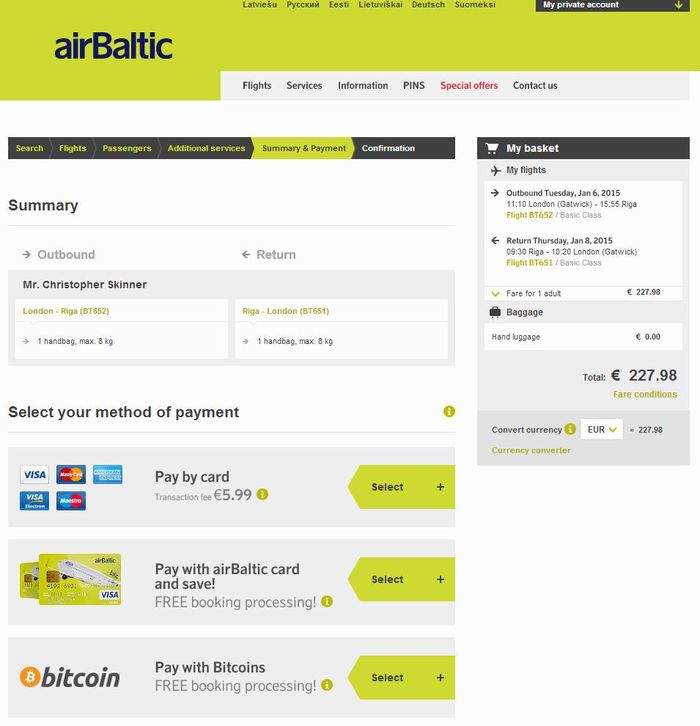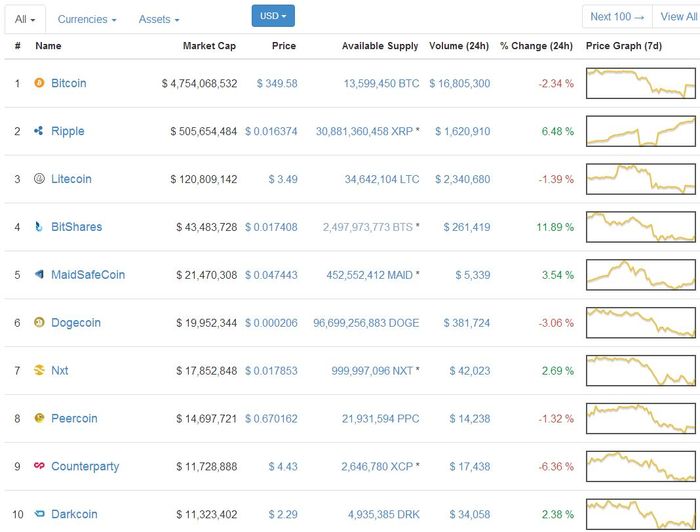
I just spent a couple of days talking about cryptocurrencies and the bitcoin thing again. This time in Oslo at our fourth meeting of the Financial Services Club Nordic Region.
It still amazes me how many misperceptions and distorted views there are out there about this area. One guy came up to me and said, for example, “oh, you’re talking about bitcoin again? I thought that was dead?”
It’s not dead and, in fact, for those who bother to think about its potential it’s very much alive. The issue is that there are lots of misunderstandings out there. Here are a few common ones.
MtGox failure killed bitcoin
MtGox's failure has damaged bitcoin’s credibility, but the ecosystem is still moving ahead regardless. This was an unfortunate moment in bitcoin’s history but believing this killed the cryptocurrency is a bit like saying the UK Pound is dead because Northern Rock failed.
Bitcoin will not survive long-term
Well, it’s survived six years and multiple hacks and attacks, and it’s still going strong. The issue really comes down to that it is a bit of a Wild West out there, but there are people fighting back like Roger Ver. Mr. Ver has been instrumental in the development of the currency and has been hacked a number of times. In a recent Wired article, he says: “I am tired of seeing real criminals, with lots of victims being ignored, while traditional law enforcement is busy going after perpetrators of victimless crimes such as those involved in the Silk Road Marketplace.” Result? He’s crowdsourcing a bounty to catch the hackers and bring them to justice.
Bitcoin is only for illegal activities
This myth comes from the Silk Road, a torrent-based website that sold drugs and other illegal services. That site got shut down and, again, saying bitcoin is to blame for this is a bit like saying the exchange of cash for drugs on a street corner is the US dollar’s fault. It’s not. It’s the fault of those who are using the currency for these activities.
Bitcoin trades are anonymous
No. Bitcoin transactions are visible on a public ledger called the blockchain that link every transaction to your IP address and therefore can be traced. In fact, achieving total anonymity in Bitcoin is pretty much impossible.
Bitcoin is just for geeks
Probably true today, as it’s very difficult to use. However, firms like Circle are simplifying this and, given the state of where we are right now, many would say that bitcoin is a bit like the internet before Tim Berners-Lee. It’s a great technology but needs something to simplify it before consumers will really get it. And that is happening, as demonstrated by my checkout on Air Baltic the other day.

You can use the blockchain without the currency
No you can’t. In order to make the blockchain work, you must have a native currency behind it that records the value exchange using a public and private key. Therefore, you could use another cryptocurrency to use the blockchain, but bitcoin has most of the cryptocurrency market liquidity today. Therefore, it kind of doesn’t make sense to go and invent another one. If you want to know more about why the blockchain has to link to the currency, read my last blog on that subject.
There are so many cryptocurrencies out there, I will wait to see which one wins
This is actually not a bad statement. There are several cryptocurrencies out there – Litecoins, Dogecoins, Peercoins, Darkcoins, Ripple and more – but the fact is that, as mentioned, bitcoin has the lion’s share of the market.

However, it has lost traction this year. After MtGox’s collapse, the market for bitcoin is worth less than a third of what it was a year ago. Meanwhile, other services like Ripple have gained more attraction as a result
Ripple is a payment system, currency exchange and remittance network built upon a distributed, open source Internet protocol like bitcoin, with a blockchain consensus ledger and native currency called ripples (XRP).
Meanwhile, Bitcoin is near ten times the size of trading of Ripple, is older and has more fans – 1,000’s of man years of open sourced development and investment have been invested in Bitcoin. No other cryptocurrency has that investment, so this is one that looks like the winner today (as does Ripple). You can wait but, if you do, then you will miss the opportunity here.
Finally, a key stated view of all of the cryptocurrencies is that their main aim in life is to get rid of the middle man (banks and payments processors) by using the network to provide secure, instant and nearly free global financial transactions of any size, with no chargebacks and no third party overheads involved.
This is a key statement and is illustrated well be activity on the blockchain that caught my attention over the weekend.
An $81 million transaction took place on the blockchain.
That was an $81 million transaction that took place immediately, in real-time, and it cost just 4 cents to process.

It could have even taken place on a Sunday morning, as Bitcoin operates at near zero cost 24*7*365.
That’s massively impactful and why I’ve written a couple of articles about how this massively impacts the future of SWIFT, but it’s not just SWIFT. It’s everything.
As I see it, when you can process any value exchange in real-time for nearly free, what happens to our back-end infrastructures? What does it mean for CHAPS, VocaLink, CHIPS, Fedwire, Visa, MasterCard, TARGET2, SEPA and more? And how much are these processors considering these impacts?
It’s no wonder that these quotes speak volumes:
“I have invested in Bitcoin because I believe in its potential, the capacity it has to transform global payments is very exciting. It has been obvious to us all for quite some time that people aren’t satisfied with the business as usual approach adopted by the major payment networks. There’s a real desire for greater levels of control, freedom and scrutiny over what happens with our money, Bitcoin addresses these concerns and that is why so many people believe it represents the future.” Richard Branson, November 2014
“The blockchain greatly reduces the need for third-party payments processors and the fees they charge.” Reid Hoffman, November 2014
“Bitcoin is exciting because it shows how cheap it can be.” Bill Gates, October 2014
“We have a chance to rebuild the system. Financial transactions are just numbers; it’s just information. You shouldn’t need 100,000 people and prime Manhattan real estate and giant data centers full of mainframe computers from the 1970s to give you the ability to do an online payment.” Marc Andreessen, October 2014
What this means in reality, is that there will be a decentralised service that can be used outside the banking and government system for those who want to take advantage of that capability. There will also be a much larger community that will continue to deal with finance and banking, as they used to, but now through a cheap protocol technology to record their transactions on the blockchain.
In other words, the financial markets are looking at the smart contracts capability of the blockchain to see how they can leverage this technology. The markets operate as they always have, with governments taxing the citizens who use bitcoin exchanges on their conversions of monies in and out of those exchanges. The banks offer secure storage of bitcoin and other services, but also record their messages, settlements, clearing and processing on the blockchain.
Soon we will see banks that can securely process multimillion dollar transactions on the blockchain for near free. Then the question is: what do we pay for? We pay for the trust, the guarantee, the certainty and the confidence that our bank will process those transactions securely and reliably and reimburse us for any losses if they do not.
That’s the beauty of this new technology protocol and it will revolutionise banking, payments and financial markets. The question is when rather than if.
Chris M Skinner
Chris Skinner is best known as an independent commentator on the financial markets through his blog, TheFinanser.com, as author of the bestselling book Digital Bank, and Chair of the European networking forum the Financial Services Club. He has been voted one of the most influential people in banking by The Financial Brand (as well as one of the best blogs), a FinTech Titan (Next Bank), one of the Fintech Leaders you need to follow (City AM, Deluxe and Jax Finance), as well as one of the Top 40 most influential people in financial technology by the Wall Street Journal's Financial News. To learn more click here...

